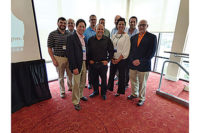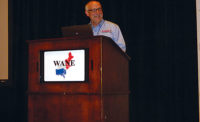The Wholesalers Association of the North East welcomed back speaker Andy Ray to its recent annual Leadership Development Conference in Washington, D.C.
And Ray, who spoke to WANE members at the 2015 conference in Annapolis, Md., opened his playbook even more this time concerning how managers can achieve meaningful results.
“Has your management team proactively created a significant and sustainable $100,000 result in the last 60-90 days?” Ray asked.
The rest of Ray’s session provided insight into how management teams can position themselves to work toward that category. He calls it “radical impact” that happens when a manager creates a significant and sustainable result that matters in a business. Ray then categorized four types of managers.
1) There is the low-capability and low-commitment manager, referred to as the “later, dude” manager.
2) There is the low-commitment and high-capability manager.
3) The high-commitment, lower-capability manager is referred to as a “fort builder.” “This is the type of manager that has been with you a long time. They don’t want to go anywhere and have never had a developmental opportunity to get broad and deep,” Ray said. “They make sure every ‘I’ and ‘T’ is crossed. They bog up the whole works.”
4) The ideal manager, Ray said, has both high-capability and high-commitment levels.
Additionally, managers must strive to create a collaborative environment. “All of us are smarter than any of us,” Ray said.
Also helpful is focusing efforts on important tasks and initiatives aimed at generating impactful results. “We spend a lot of time on things that have little impact,” Ray said.
Ray had session attendees break into groups and put into effect action plans on topics (chosen by the groups) such as reducing overtime costs, eliminating underperforming employees, reducing human errors, instituting a 1% price increase to select product categories, focusing on follow-up quotes and working on sales with existing customers. Some Ray gems from this interactive session:
-
“In order to develop people you have to invest in them.”
-
“It takes six times longer to rework something as opposed to getting it done right the first time. Eliminating errors, while not sexy, is a big one.”
-
“We tend to under-communicate during change instead of over-communicating.”
-
“A lot of businesses think of quotations as a service. We quote to win an order. Using the quoting opportunity to increase the opportunity to sell is a real sound growth strategy. Working on quote follow-up and quote closing rates is a good opportunity to get more business.”
-
“Selling more to existing customers is the No. 1 most implementable thing you can do.”
-
“Bang on your value. You all have it.”
WANE attendees then heard from a panel consisting of National Utility Contractors Director of Government Affairs Will Brown, Energy Equipment and Infrastructure Alliance President and CEO Toby Mack and National Association of Manufacturers Director, Employment Policy Amanda Wood. The panel discussed hot-bottom topics such as water infrastructure, the current energy climate (fossil fuels) and making one’s voice heard to elected officials.
This year’s capstone presentation was delivered by retired Marine Lieutenant Colonel Justin Constantine, who detailed his `survival of a gunshot wound to the head while serving in Iraq and also talked about the importance of leadership skills.
“Leaders are made and not born,” he said. “A great leader empowers employees to work at their highest levels. Pay attention to what people do well.”
WANE’s Leadership Development Conference kicked off the evening before with a well-received progressive dinner in the Penn Quarter area of Washington.
This article was originally titled “Make a radical impact” in the August 2017 print edition of Supply House Times.






